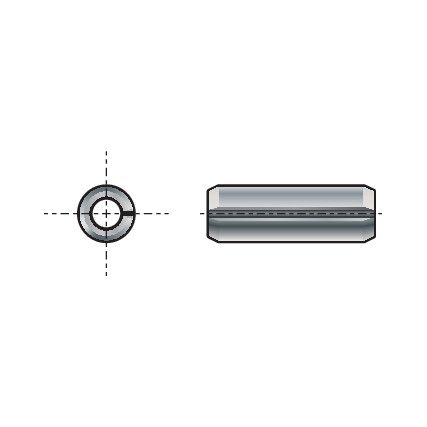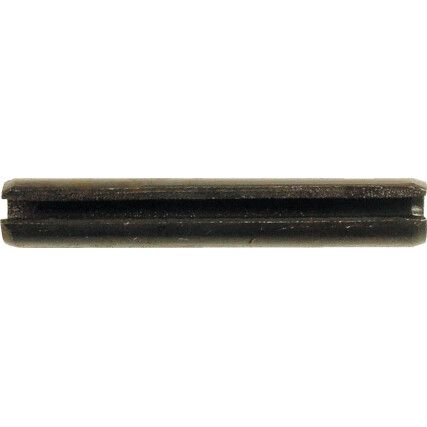Spring Pins
Spring pins (often referred to as 'roll pins') are a commonly used fastener type than allows users to securely fix various parts and materials together. Cromwell's range of spring pins are designed to meet all leading standards, for ultimate strength, reliability, and peace of mind.
Cromwell stocks a varied range of high-quality spring pins, available in a range of sizes, styles, and materials to suit fastening applications.
What are spring pins?
Spring pins are general purpose components used across a wide range of fastening applications. They are hollow, tube-like fasteners, usually made from carbon steel, alloy steel, or stainless steel.
As it is installed, the spring pin is compressed - applying constant pressure on each side of the hole wall. This allows users to provide a secure fix to various parts of a machine, with the spring pin acting as a self-retaining fastener between parts.
Why a spring pin?
When compared to solid dowel pins, spring pins offer a multitude of benefits, including:
• Spring pins can fit into holes without the need for reaming.
• Can be used in both through-hole and blind applications.
• Can be installed quickly and easily with an ordinary hammer or other equipment.
• Cause no damage to the host material.
• If needed, multiple spring pins can be used to increase the shear strength.
When are spring pins used?
Spring pins are one of the most common types of mechanical fastener, and are used across all kinds of industries, including:
• Factories
• Carpentry
• Machinery
• Automotive
• Aerospace
• Electrical
Types of spring pin
There are a couple of different types of spring pin; each with their own benefits and uses. Here are the main types of threading tap we stock at Cromwell:
• Slotted spring pins - Slotted spring pins are highly flexible spring pins with a slot and a hollow design, giving the pin the ability to self-lock. The width of the slot is less than the pins wall thickness, which prevents any nesting or interlocking with other pins.
• Slotted tooth spring pins - Slotted tooth spring pins have a zip-like design with staggered teeth which interlock when the spring is compressed. This ensures roundness of the pin and minimises disruption or movement in environments with lots of disturbance or vibration.
• Coiled spring puns - Coiled spring pins are light yet heavy-duty spring pins that evenly distribute pressure and stress throughout the cross section of the pin. The flexible coil design does a much better job at absorbing shocks than other spring pins, which results in far less damage to the part or machine.
If you're looking for personalised recommendations about the right type of spring pin to use for your applications, ask our experts for specialised advice.
Considerations when buying spring pins
When buying spring pins, there are a couple of key considerations to keep in mind in order to get the best results for your desired applications.
• Material - Most commonly, spring pins are made from alloy or carbon steel. These materials are more than adequate in terms of strength; yet provide little protection against corrosion without a strong coating. Stainless steel spring pins trade some of that strength for exceptional durability and protection against corrosion, so pick the material of your spring pins carefully based on your usage.
• Coating - Spring pins are commonly coated in order to help protect against corrosion. This is especially important on spring pins that aren't made from stainless steel. Common coatings include: Light oil, zinc plating, phosphate, and cadmium.
Spring pin jargon buster
Noteworthy standards:
• DIN 1481 - Specifies dimensions and standards for spring-type straight pins
• ISO 8752 - Specifies characteristics of slotted spring-type straight pins
• DIN 7343 - Specifies dimensions and standards for coiled spiral spring pins
FAQs
What size hole for spring pin?
As a general rule of thumb, it is recommended that spring pins are fitted in a hole with a diameter the same or 0.1mm larger than the diameter of the pin. The expanded diameter should be 0.2-0.3mm larger than the diameter of the pin.
How does a spring pin work?
Spring pins work by deforming and then expanding once they're in place. They apply constant pressure to the sides of the material wall in order to remain secure.


